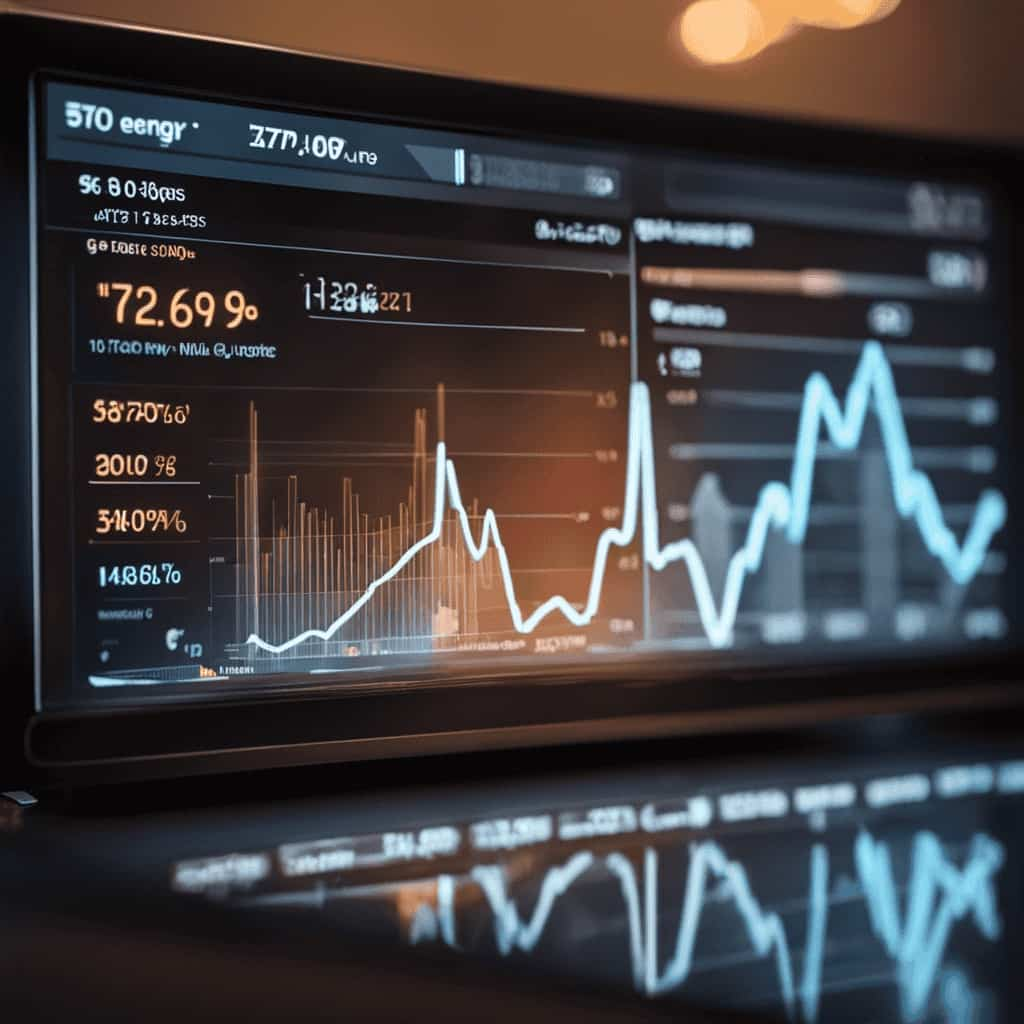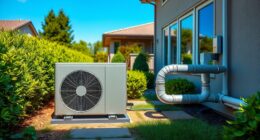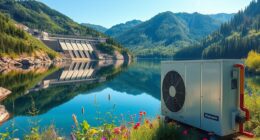Are you seeking to make a well-informed choice in selecting a heat pump? Your search ends here! In our comprehensive guide on heat pump energy ratings, we will equip you with all the necessary information.
From understanding energy efficiency ratings to comparing different brands, we’ve got you covered. Get ready to dive into the world of heat pumps and discover the secrets to choosing a high-efficiency option.
Let’s get started!
Key Takeaways
- SEER and HSPF ratings help homeowners choose a suitable heat pump based on cooling and heating efficiency.
- Regular maintenance, proper insulation, and choosing the right size and installation are crucial for maximizing heat pump energy efficiency.
- Comparing SEER and HSPF values of different brands aids in selecting the most energy-efficient heat pump.
- Energy efficiency labels, such as EER, SEER, HSPF, and Energy Star Certification, provide valuable information about the benefits of energy-efficient heat pumps.
Understanding Heat Pump Energy Efficiency Ratings
In this article, we’ll explain the key factors involved in understanding heat pump energy efficiency ratings.

Heat pump maintenance is essential in maximizing the benefits of heat pumps, and energy efficiency plays a vital role in achieving optimal performance.
When it comes to heat pump energy efficiency ratings, there are a few important aspects to consider. The Seasonal Energy Efficiency Ratio (SEER) measures the cooling efficiency of the heat pump, while the Heating Seasonal Performance Factor (HSPF) evaluates its heating efficiency.
Both ratings provide valuable information to homeowners, allowing them to make informed decisions about their energy consumption. By understanding these ratings, homeowners can choose a heat pump that suits their needs and budget while maximizing energy savings.
Now, let’s delve into the factors that affect heat pump energy efficiency.

Factors Affecting Heat Pump Energy Efficiency
To understand the factors affecting heat pump energy efficiency, we need to examine how different variables impact the overall performance of the system. Here are four key factors that can greatly influence the efficiency of a heat pump:
-
Heat pump maintenance: Regular maintenance, such as cleaning filters and coils, lubricating moving parts, and checking refrigerant levels, is crucial for optimal performance. Neglecting maintenance can lead to decreased efficiency and higher energy consumption.
-
Impact of climate: Heat pumps are designed to work in a specific temperature range. Extreme hot or cold climates can reduce their efficiency. In colder climates, heat pumps may need to rely on auxiliary heating, which can increase energy usage.
-
Insulation and air sealing: Proper insulation and air sealing in a home can help minimize heat loss or gain. This allows the heat pump to operate more efficiently by maintaining a consistent indoor temperature.

-
Sizing and installation: Choosing the right size heat pump for your space and having it installed correctly are essential. Oversized or improperly installed units can lead to inefficiencies and higher energy consumption.
Comparing Energy Efficiency Ratings of Different Heat Pump Brands
We can assess the energy efficiency ratings of different heat pump brands by comparing their SEER and HSPF values. These ratings provide valuable information about the performance and efficiency of a heat pump.
When comparing different brands, it’s important to consider the SEER (Seasonal Energy Efficiency Ratio) and HSPF (Heating Seasonal Performance Factor) values. A higher SEER indicates better cooling efficiency, while a higher HSPF indicates better heating efficiency.
By comparing these values, we can determine which heat pump brands offer the most energy-efficient options. This information is crucial for making a heat pump cost comparison and choosing a system that will provide the greatest benefits in terms of energy savings and comfort.

Understanding the energy efficiency ratings of different heat pump brands will help consumers make an informed decision and select the most suitable option for their needs.
In the next section, we’ll discuss how to interpret heat pump energy efficiency labels, which will further assist in comparing different models.
How to Interpret Heat Pump Energy Efficiency Labels
Our guide will explain how to interpret heat pump energy efficiency labels and help you understand what they mean for your heating and cooling needs. To make it easier for you to understand the information provided on the labels, we’ve compiled a list of key points:
-
Energy Efficiency Ratio (EER): This measures the cooling efficiency of the heat pump. Higher EER ratings indicate better energy efficiency.

-
Seasonal Energy Efficiency Ratio (SEER): This measures the overall cooling efficiency of the heat pump over a cooling season. Higher SEER ratings indicate better energy efficiency.
-
Heating Seasonal Performance Factor (HSPF): This measures the heating efficiency of the heat pump. Higher HSPF ratings indicate better energy efficiency.
-
Energy Star Certification: Look for the Energy Star label to ensure that the heat pump meets or exceeds the energy efficiency standards set by the Environmental Protection Agency.
Interpreting energy labels is crucial in understanding the benefits of energy-efficient heat pumps. By choosing a heat pump with higher energy efficiency ratings, you can reduce your energy consumption and save money on your heating and cooling bills.

Tips for Choosing a High-Efficiency Heat Pump
When considering a high-efficiency heat pump, it’s important to research different models and compare their energy ratings. High efficiency heat pumps offer numerous benefits, making them a cost-effective choice for homeowners.
These pumps are designed to provide optimal heating and cooling while consuming less energy, resulting in lower utility bills. By utilizing advanced technology, high efficiency heat pumps can extract heat from the air or ground and transfer it indoors, even in cold weather. This makes them an excellent option for regions with moderate to mild climates.
Additionally, high efficiency heat pumps often come with features such as variable speed compressors and programmable thermostats, allowing for precise temperature control and further energy savings.
When choosing a high efficiency heat pump, it’s crucial to consider the size and layout of your home, as well as the local climate, to ensure maximum cost effectiveness and comfort.

Frequently Asked Questions
What Are the Different Types of Heat Pumps Available in the Market?
There are several types of heat pumps available in the market, each with its own pros and cons. It’s important to consider factors such as efficiency, cost, and climate compatibility when choosing the right heat pump for your needs.
Can a Heat Pump Be Used for Both Heating and Cooling Purposes?
Yes, a heat pump can be used for both heating and cooling purposes. Heat pump versatility allows us to efficiently regulate indoor temperature throughout the year, providing the benefits of both heating and cooling systems in one.
What Is the Average Lifespan of a Heat Pump?
The average lifespan of a heat pump depends on various factors, such as maintenance requirements and usage patterns. Regular maintenance can extend the lifespan of a heat pump, ensuring optimal performance and efficiency.
Are There Any Government Incentives or Rebates Available for Purchasing a High-Efficiency Heat Pump?
Yes, there are government incentives and energy rebates available for purchasing a high-efficiency heat pump. These incentives can help offset the cost and encourage the use of more energy-efficient heating and cooling systems.

How Often Should a Heat Pump Be Serviced and Maintained to Ensure Optimal Energy Efficiency?
To ensure optimal energy efficiency, heat pumps should be serviced and maintained regularly. Common maintenance issues include cleaning or replacing filters, checking refrigerant levels, and inspecting electrical connections.
Conclusion
In the vast sea of heat pump options, understanding energy efficiency ratings can be like navigating through choppy waters.
But fear not, for with our comparative guide, you can steer towards a high-efficiency heat pump that will keep you sailing smoothly.
By deciphering energy efficiency labels and considering factors that affect efficiency, you’ll be well-equipped to make an informed decision.

So set sail on a journey towards energy savings and comfort, and let the wind of knowledge guide you to the best heat pump for your needs.









